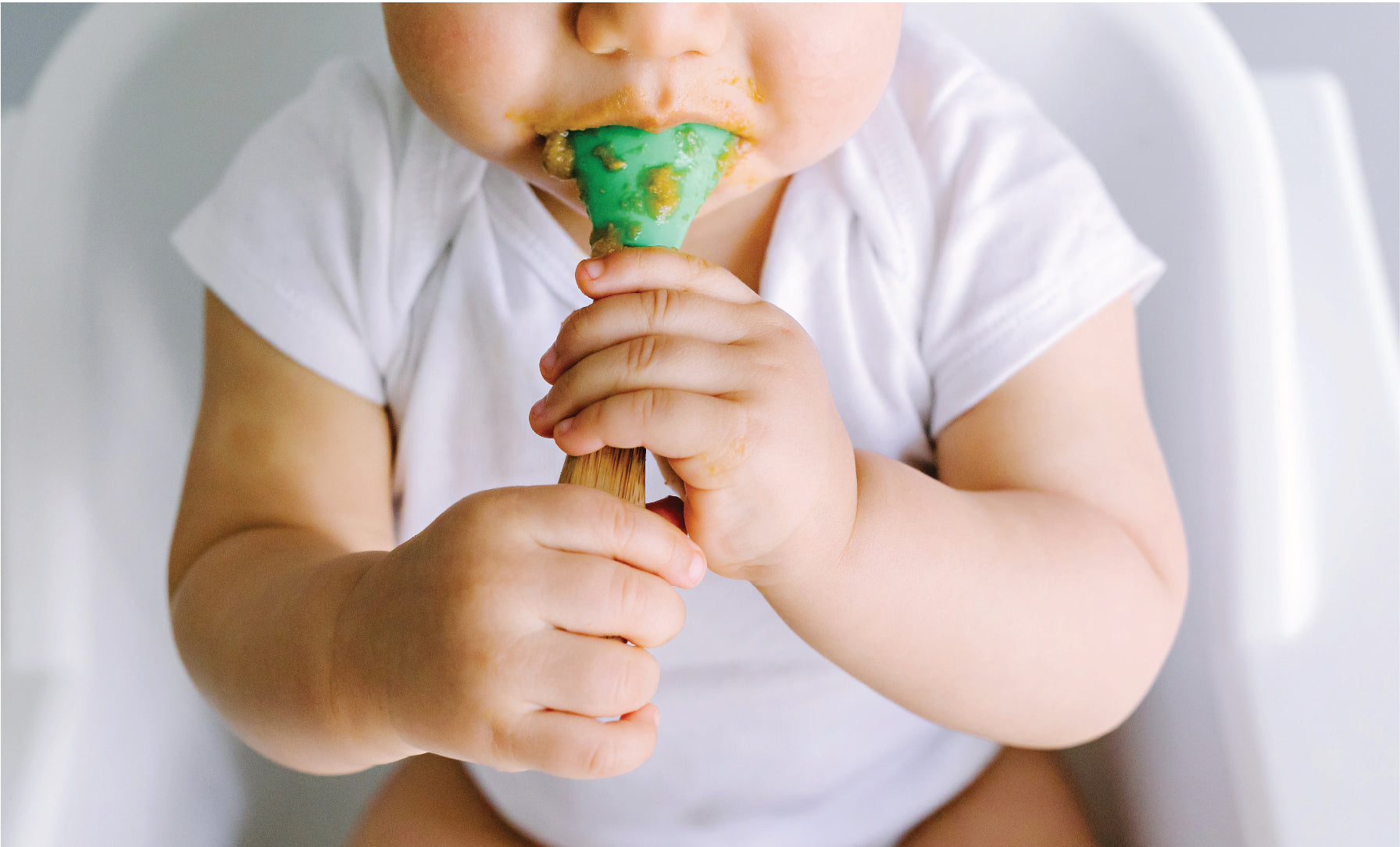TABLE OF CONTENTS
Written by Hillary Bennetts
January 04, 2021
Introducing Solids: Baby-Led Weaning vs. Purees

Introducing solids is a phase that invokes a lot of emotions for parents - excitement, anxiety, and even a little bit of sadness as it comes as a sign that your little one is growing up. This phase also comes with some decisions - when to start, what to offer, and what approach to take. We've previously shared our do's and dont's for introducing solids so now we're focusing on what approach to take.
There are different approaches to introducing solids or “complementary feeding” as it is sometimes called as initial solids are intended to complement the nutrients and energy provided by breast milk or formula to support proper growth and development starting at around 6 months.
Some families choose to offer purees while others choose a newer approach known as baby-led weaning (BLW), while some do a combination of both that’s called Baby-Led Introduction to Solids (BLISS). All three approaches have their benefits, and we break them down below:
The benefits of baby-led weaning

- Enhances baby’s sensory experience: Exposure to different foods with different textures provides a more comprehensive sensory experience. Baby is exposed to different colors, smells, and textures, and they’re able to learn to recognize types of food by these characteristics.
- Provides convenience and connection: Let’s be honest, it’s easier when baby can eat the same as the rest of the family and you don’t have to make (or clean up!) multiple meals. It also encourages families to eat together, which has benefits far beyond nutrition.
- Teaches self regulation: Allowing baby to take control of what and how much she eats rather than a parent offering a spoon until the portion is gone may support the responsiveness to internal hunger and satiety cues, leading to better energy self-regulation. Studies have shown that better self-regulation is associated with a lower risk of obesity.
- Supports motor development: Learning to grasp food and bring it to the mouth helps to develop baby’s motor skills.
The benefits of purees

- Easier to provide more nutrient intake: Purees may offer more opportunity for nutrient density and variety as we can better manage what nutrients are in the food they eat. Pureed foods take out other barriers that may be difficult for baby to gum down and digest. This is particularly the case with meat and other proteins. Interestingly, it’s the nutrients found in meat like iron and zinc that are most essential at this age.
- More efficiency: By this I mean that generally more food gets in the belly than on the baby or on the floor/to the dog. Certainly messes will be made either way, it’s part of the process and something you have to expect and accept, but they tend to be a bit less with purees and spoon feeding.
- Less risk of choking: one of the most controversial aspects of BLW and one of the most nerve-wracking aspects for many parents in feeding little ones is the risk of choking. Purees have little risk of gagging and choking as they’re just slightly thicker than the milk or formula baby is accustomed to. Know that you can make purees chunkier to introduce more varied texture. Just soft cook your meat and veggies in some bone broth and gently pulse or blend, stopping before the mixture is perfectly smooth.
The best of both worlds
The good news? Neither of these approaches are all or nothing! You don’t have to be die-hard BLW or die-hard purees - you can do both! You can reap the benefits of both approaches by offering a combination of food types, textures, and flavors. The key is to still let baby self-feed as much as possible by offering pieces of food and loaded spoons that they can feed themselves. Rather than just spooning food into baby’s mouth in a repetitive or mindless way, you wait for a cue from them that they’re ready (like an open mouth and a lean forward). You can also offer both loaded spoons, pouches, and small soft bites for them to pick up and explore or eat themselves. This hybrid approach is known as Baby-Led Introduction to Solids (BLISS) and offers benefits from both approaches:
The benefits of BLISS
- Maximizes nutrient density: Combining both approaches provides the best opportunity for optimal nutrient density by increasing the ways in which you can get food into your little one’s belly.
- Provides a valuable sensory experience: Baby still self feeds to self regulate and learn motor skills.
- Cultivates togetherness and positivity: Offering baby some of what you’re eating, even if you’re adding in purees still encourages family meals and a positive relationship with food.
- Lowers choking risk: Combining approaches allows you to choose which foods to puree and which to offer solid (e.g., offer more difficult foods like meat as a puree) while maintaining other benefits of BLW.
- Provides flexibility: You’ll find yourself in different scenarios, like at a family event, traveling, or out to dinner. Sometimes the options won’t be great or you won’t be up for cleaning up a big mess. In those instances, it’s nice to be able to flex between the two approaches to what works in that situation.
Do what works for you
No matter what approach you take, remember that it can take more than ten exposures to a food for a kiddo to accept it (seriously), so keep offering in a friendly, non-forceful way. Watch for baby’s hunger and fullness cues and don’t force food if they’re telling you they’re done.
Finally, remember that every kid is different and will take to solids at different times. If baby isn’t into finger foods right away or can’t figure out how to hold a spoon, don’t sweat it. Just keep offering nutritious foods of varied flavors and textures. To make the journey easier, consider our baby food subscription, created to support you with high-quality, ready-to-serve options at every stage. You’ll have your challenges and baby will have her opinions, but know that through it all, you’re setting baby up for success with good nutrition in a positive environment.
 Hillary Bennetts is a nutritionist and business consultant. She provides business consulting and content creation for companies in the health and wellness industry. Hillary holds a Bachelors in Economics from Washington and Jefferson College, an MBA from Emory University’s Goizueta Business School, and is a certified as a Nutrition Consultant through Bauman College. A marathoner, mountain climber, and mama, she lives in Colorado with her husband and two sons.
Hillary Bennetts is a nutritionist and business consultant. She provides business consulting and content creation for companies in the health and wellness industry. Hillary holds a Bachelors in Economics from Washington and Jefferson College, an MBA from Emory University’s Goizueta Business School, and is a certified as a Nutrition Consultant through Bauman College. A marathoner, mountain climber, and mama, she lives in Colorado with her husband and two sons.You Might Also Like
· 1 min read · Recipes
· 7 min read · Education


















































